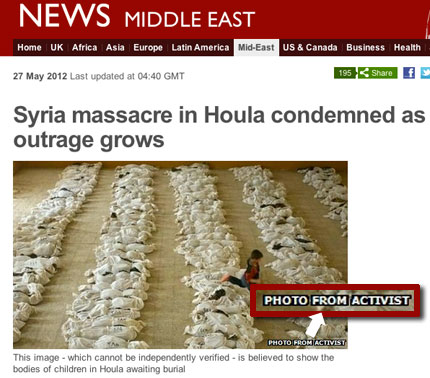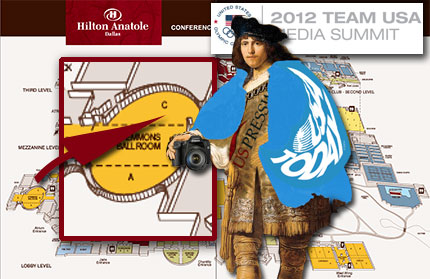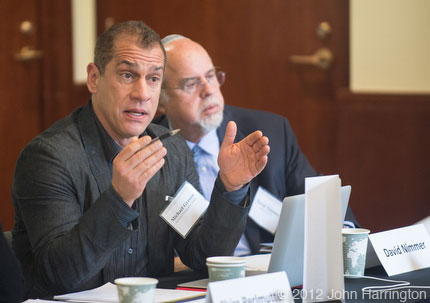The Value of an Upgrade
Please post your comments by clicking the link below. If you've got questions, please pose them in our Photo Business Forum Flickr Group Discussion Threads.
Occasional Musings and News About the Business of Being a Photographer

Being a professional photographer - and the definition of that would be best encapsulated here - is a challenge. We've written before about the fallacy of the pride in being a starving artist. In most every profession I can think of, you put in your time financially challenged, with some modicum of success as a result of years of hard work. Most people understand that you pay your dues, and then you can do okay. Yet, as photographer James Maden points out in his most recent article on SportsShooter.com - Should You Become a Professional Photographer - "There can be few other careers where you regularly work for the world’s largest companies like the New York Times and Time Magazine, are at the pinnacle of your career yet don’t earn enough to make a living."
As Madelin notes, and is also cited in the British Journal of Photography, the winner of one of the world's most prestigious photojournalism contests, Samuel Aranda, was quoted as saying "They called me yesterday around 7pm, and told me that I had won the World Press Photo," Samuel Aranda tells BJP in his first interview of the day. "At that exact moment, I was checking my bank account because I didn't know how I was going to pay my rent this month. I was crunching numbers to make it work." Aranda, in his early 30's was on assignment for the New York Times, and is represented by the Corbis agency. "
This state of affairs is a problem.
Fact-checking took a holiday at the BBC today, as a credit line of "photo from activist" was used to identify propaganda promoting the activist's cause, on the front page of the BBC's website for an article titled "Syria massacre in Houla condemned as outrage grows." The problem? Among the many, is that this photograph, purported to have been taken on or about Friday, May 25th, 2012 in Houla, Syria, and represented in the photo caption as "believed to show the bodies of children...", was actually taken on May 27, 2003, 9 years earlier, in Al Musayyib, Iraq, by photographer Marco Di Lauro, a photojournalist for Reportage by Getty Images.
The front page of the website, below, shows the image in it's mis-credited and mis-represented form:
 The image here shows the image on Di Lauro's website, with the proper caption:
The image here shows the image on Di Lauro's website, with the proper caption:
"An Iraqi child jumps over a line of hundreds of bodies, in a school where they have been transported from a mass grave, to be identified. They were discovered in the desert in the outskirts of Al Musayyib, 40 km south of Baghdad. It has been estimated that between 10,000 and 15,000 Iraqis had been reported missing in the region south of Baghdad. People have been searching for days for identity cards or other clues among the skeletons to try to find the remains of brothers, fathers, mothers, sisters and even children who disappeared when Saddam's government crushed a Shi'ite uprising following the 1991 Gulf War."Di Lauro, who is a freelance photographer represented by Reportage by Getty Images, also licenses this image on the Getty website here.
 According to the NASDAQ website (here) the Financial Times is reporting that Goldman Sachs has been retained to consider an IPO and other options. Photo Business News reported that federal regulators had approved Hellman & Friedman taking Getty private (Getty Images - Moving Forward, 3/19/08) at a rate of $2.1B (according to Forbes) and $2.4B according to the Nasdaq site. They are considering a valuation for the IPO of $4B. Getty at one point saw highs of $90+ a share in their heyday, before plummeting and then going private. With the Shutterstock IPO revealing their average stock sale of $2.05 per image in an SEC filing (as reported by Photo District News, here), how can Getty see a $4B valuation? Dubious, at best.
According to the NASDAQ website (here) the Financial Times is reporting that Goldman Sachs has been retained to consider an IPO and other options. Photo Business News reported that federal regulators had approved Hellman & Friedman taking Getty private (Getty Images - Moving Forward, 3/19/08) at a rate of $2.1B (according to Forbes) and $2.4B according to the Nasdaq site. They are considering a valuation for the IPO of $4B. Getty at one point saw highs of $90+ a share in their heyday, before plummeting and then going private. With the Shutterstock IPO revealing their average stock sale of $2.05 per image in an SEC filing (as reported by Photo District News, here), how can Getty see a $4B valuation? Dubious, at best.
 When you think "olympic" the concept of "top of their game", or "monumental" comes to mind. While "Olympic" refers generally (and usually) to the Olympic Games, it is often used as a verb (no doubt much to the chagrin of Olympic Officials) to characterize the best. This year, when the Olympics arrives in London, it seems that USA Today is sending in the farm team rather than the best, when it comes to their photography staff, for the most part.
When you think "olympic" the concept of "top of their game", or "monumental" comes to mind. While "Olympic" refers generally (and usually) to the Olympic Games, it is often used as a verb (no doubt much to the chagrin of Olympic Officials) to characterize the best. This year, when the Olympics arrives in London, it seems that USA Today is sending in the farm team rather than the best, when it comes to their photography staff, for the most part.
USA Today staff photographers with decades of experience covering sports were told last week that, well, their services wouldn't be needed in London. USA Today Sports Media Group Company, which now owns the US Presswire photo wire service, known to some as the "let's all work for photo credit, press-file hot dogs, and a few stock sales" photography operation, decided that they would choose the team going to cover the olympics this year, save for just one well regarded USA Today photographer. If there was any doubt that the staff will be wet behind the ears, you need look no further than the list of those credentialed - Richard Mackson's teenage kid seems to be credentialed as a part of the team of pros going over and she either just (or will soon) graduate from...wait for it... high school.
If you're looking to talk to the USA Today photo booth out at the Olympic Media Summit at the Hilton Anatole, going on today and tomorrow, they won't be there. Well, the booth is there - in Stemmons Ballroom C (on the right as you walk in), but it's not actually staffed by USA Today staffers - instead, it's staffed by US Presswire staff and contractors. So if you see someone wearing a USA Today credential, shirt, or beneath one of their banners, it's really a US Presswire person cloaked in the storied name of USA Today.
For decades, the USA Today photo staff has put forth the best of the best to cover the Olympics. So too has Sports Illustrated, and other storied organizations that see covering the Olympics as the pinnacle of sports photography. I am sure that Getty Images will be quite interested to know that US Presswire is parading around under the cloak of USA Today, seeing as the US Olympic Committee encourages people (here) to contact Getty for rights-manged images, noting "In addition, Getty Images has a vast archive of U.S. Olympic-related images." In fact, according to the Getty website here, they say "...As the official photographic agency of the International Olympic Committee since 1988, we have the imagery you need to set your Olympics coverage apart." While I am sure that USA Today has shared content with their sister organization (Gannett) newspapers in the past, it doesn't take much to consider that Getty's revenues will be affected by US Presswire syndicating their content from the Olympics outside of USA Today and Gannett. Then again, maybe not. Maybe Getty is right - their coverage may well be "...set...apart.." and not even in the same league as USPWs. In this case, Getty is the big leagues, and, yes, coming full circle, the USA Today team, filled with USPW photographers, seems to be the farm team.
I'm guessing that the new President and Publisher of USA Today, who will be reporting to Gannett (NYSE: GCI), Larry Kramer, (announced just today, here) will be wondering why a teenager is on the credentials list along with so many other US Presswire photographers when his thoroughbred sports photographers didn't make the cut. According to the USA Today article, he's in charge of the USA Today Sports Media Group, so this issue falls right under his responsibilities list.
 The US Copyright Office held a roundtable discussion today in Washington DC, at the George Washington University Law School on the subject of how (and if) to propose implementing a form of a Small Claims Court for copyright infringement claims. The roundtable was filled with rights-holders from around the country who came to share their views on the benefits and challenges that a Small Claims Court venue would have on rights-holders.
In his opening remarks, David Kappos, the Under Secretary of Commerce for Intellectual Property and Director of the United States Patent and Trademark Office, said that the issue of an Intellectual Property "Small Claims" system is a "burning platform," that must be addressed.
The US Copyright Office held a roundtable discussion today in Washington DC, at the George Washington University Law School on the subject of how (and if) to propose implementing a form of a Small Claims Court for copyright infringement claims. The roundtable was filled with rights-holders from around the country who came to share their views on the benefits and challenges that a Small Claims Court venue would have on rights-holders.
In his opening remarks, David Kappos, the Under Secretary of Commerce for Intellectual Property and Director of the United States Patent and Trademark Office, said that the issue of an Intellectual Property "Small Claims" system is a "burning platform," that must be addressed.




Getty Images seems to be talking out of both sides of their mouth when it comes to intellectual property. And the person doing the talking is their CEO, Jonathan Klein, who ventured down to to SXSW recently and was interviewed by TechCrunch TV.
There are two videos of Klein, For Pinterest, Revenue Will Turn Copyright Questions Into Real Problems, as well as Getty Images CEO On Building A Company That Lasts:
Klein, in the first video, has essentially given a free pass to students, educators, and any other use that can be defined as "non-commercial" for all of Getty's images to be used, because, as he said, they won't come after them. Let's take a look at what he said, and offer commentary on it:
On Pinterest and Facebook Klein said:
"Ok let's take a step back because you've raised a very big issue let's talk about intellectual property more generally."Ok, so we're talking about not just Pinterest and Facebook, but ALSO, all other IP on these types of websites.
"We are entrusted by our partners, photographers and filmmakers and contributors of whom we have 125,000 to make sure that when their imagery is being used for commercial purposes they are paid."No, actually, they entrust you to ensure they are paid for *any* use.
"...as the largest imagery business in the world by a significant margin it's in our interests for people to be visually literate. So we don't stop consumers playing with our images, we don't stop kids downloading our images to use in school projects or for educational purposes, we don't stop the proliferation of imagery still or moving."You may be teaching them to be "visually literate", however, you're also teaching them that it's okay to use intellectual property for free. Further, you said you don't stop uses for "educational purposes", so that would seem to also include uses in textbooks for schools?
" Where we do draw the line, is where somebody is generating revenue, commercial revenue, on the back of our image."Ok, so, as long as an organization is losing money, they have a free pass? How do you define "commercial revenue"? What about non-profits? Are they commercial, or not? Just so we're clear - the attraction to, say, Facebook, by the sharing of Getty images, which creates a snow-ball effect and more and more users and people come to it, so much so that the critical mass of people there on the site causes it to be valued in the billions of dollars, neither Getty, nor the content creators, have any share in the valuation of that company.
"... we sort of, um, differentiate between the use of the image and to what extent we want to be paid or we're fine with it to be just out there for the public."Ok, so theft is okay, but at some point, you draw the line? How do you think the photographers whose work is on your website will feel about this?
"Well, it's actually, we're comfortable with people using our images to build traffic and at the point in time where they have a business model..."Anyone who has investors has a business model, you just may not be aware of the details. But, again, you're pretty clear here that you've given a free pass to individuals and non-commercial uses.
"I think the difference between us and a lot of other intellectual property businesses or talent based businesses is that the cost of working with us is relatively modest. "Modest for whom? Investing in the production of images isn't cheap. Serving as the conduit by buying some hard drives and paying commissions to sales reps is cheap. Taking a 70% commission on all sales - not cheap. You seem to be suggesting that the production of images that appear on the Getty website is done by people who don't use talent to produce their images? Really?!? Are you actually saying that? Because, frankly, I know a number of Getty contributors and photographers, and they are among the most talented photographers I know, so, for you to seemingly differentiate your business from those that are talent-based is just off the mark by a mile.
"We've kept that open [right-clicking] for one simple reason, we want everybody to be extremely visually literate."Again - yes, become visually literate at the expense of legally literate. There was a huge tide of problems with legal illiteracy when it came to the sharing of music that Apple was successful at pushing back. Getty won't be able to stem that tide with this concept.
"...So everybody's become more visually literate and the success of sites which are very picture heavy like Facebook or Pinterest and the amount of traffic that they're sites have proves that there's a huge attraction in imagery."Yes, and again, where are those people who's IP that appears on these sites getting a piece of the Facebook IPO, or shares in Pinterest? What about the T&C on these sites that say that worldwide exclusive rights to the images uploaded/pinned is given to the company, and how about images appearing in ads out of users accounts on Facebook?
Use of Accepted Content by you. On a non-exclusive basis, you may use Accepted Content and any Similars for promoting or documenting you and your work, provided that these uses do not compete with or limit the rights granted to Getty Images under the Agreement.In Klein's second video appearance - Getty Images CEO On Building A Company That Lasts, he says a few choice things. Klein was on hand to give a keynote address, and celebrate Getty's 17th year in business. He talks about how they are now licensing music - does his mindset apply to music and video/multimedia as well when it comes to "free-as-long-as-its-non-commercial"?
"We're in the business of licensing content to folks who'll pay for it."So, the folks who won't pay for it - because, say, they don't have the money, you're not interested in ensuring the integrity of your images? What if someone had an image and uses it for free and jeopardizes an exclusive deal you have with someone else?
"...we may be old fashioned around here, but we actually think that people have to pay for content. We think that content creators also need to make a living."Indeed. So, which is it? Free to the startups with no revenue and/or non-profits, or, paying so the content creators can make a living?
"And the second thing is that the customer is not always right, but the customer is almost always ahead of you."Correct. So, when the customer says "I shouldn't have to pay for using a photo, how hard is it to take a photo anyway..." they're wrong.
"...So if you can provide something to the customer which is compelling, which is exciting, which is ease to use, hassle free, interesting, and affordable they'll pay for it."So, then, what's the problem - why not offer a personal use license for a few dollars? Oh, wait, you already do. So, now you're not enforcing it?
"I think you have to be open to cannibalization of your business."Now, that's just ridiculous and so far from reality.
"But really, the technology and the customer they're kind of right all the time, but that doesn't mean that you give them stuff for free. Because that's what they really want. Yea. I absolutely draw the line at that."So, it's free, or it's not? Not free, but with a wink-and-a-nod you won't come after them?
"Right to Control Claims. Getty Images shall have the right to determine, using its best commercial judgment, whether and to what extent to proceed against any third party for any unauthorized use of Accepted Content. You authorize Getty Images and Distributors at their expense the exclusive right to make, control, settle and defend any claims related to infringement of copyright in the Accepted Content and any associated intellectual property rights (“Claims”). You agree to provide reasonable cooperation to Getty Images and Distributors and not to unreasonably withhold or delay your cooperation in these Claims. Getty Images will not enter into any settlement that will compromise your ownership of the copyright in Accepted Content or that prohibits your future conduct with respect to Accepted Content without your prior written consent. Getty Images will pay you Royalties on any settlements it receives from Claims. If Getty Images elects not to pursue a Claim, you will have the right to pursue it."Problematically, there is nothing within the contract that obligates Getty to pursue a claim. In fact, if you find and infringement you are contractually obligated to bring it to Getty's attention, and must await their decision, without any timeframe, before they release you from their right to pursue the claim first. In point-of-fact, Getty could exhaust the statute of limitations on the claim and then release you - something they would be well within their rights to do, and might strategically opt to do, if the infringement were against a big client of Getty's. Further, where the contract reads, in section 2.3:
"Getty Images shall not be liable for any punitive, indirect, consequential, special or incidental damages arising out of or in connection with the Agreement, even if it has been advised of the possibility of such. In addition, Getty Images shall not be liable to you under any circumstances arising out of the misuse of Content by any third party."As such, even if you tell Getty you are losing money because they are not pursuing a claim, they will owe you nothing even after you have advised them that someone is using (or misusing) your images.
"We're not venture capitalists, we're not angel or start-up investors, we're just not good at that...And a lot, of these companies can benefit by partnering with us. That's what we're after, so we're talking to all these folks about partnering. If they're interested in driving, um, monetization to their user base they can use us as a distribution engine."Well, you may not be investing actual dollars, however, the intellectual property you "invest" by not charging for it surely has value that these companies should be paying for. These are called "in-kind" investments. You have essentially given Pinterest/Facebook/et al a free pass by way of their user base.

As someone who has been a long time Nikon user, I have spent the last 5 years blissful in my use of the Nikon D3, and then, when I needed video, the D3s. I too have had (and still do) a line of Canon lenses and cameras for some time - which was my answer to the failings of the D2X until the D3 came out. I know that there have been some folks who felt a demand and desire for the larger D3x files, however, for my applications, the extra size wasn't critical for me.
I encourage you to take a read of Joe McNally's blog here, for his take on the amazement of the camera - I think he and I are on the same wavelength in that we both saw the D3 as the answer to our needs. The D4, seems to be the answer to our dreams. Rob Galbraith has an exhaustive review of the specs, and comparisons to the previous D3 line, which is well worth a read, here. And a head-to-head on the D3 v. EOS 1D X (interesting - the " " (space) otherwise defines the EOS 1D X against the old old Nikon 1DX. You'd have thought Canon would have thought about that) appears here. Nikon Rumors has a comparative spec sheet here.
Corey Rich put together a really exceptional video here:
Because of Vimeo compression has some purists asking questions, all of which are answered by the fact that Vimeo has compression limitations. Rich promises a behind-the-scenes video next month, and at some point the uncompressed version will be available that will put to rest the questions being asked.
We look forward to getting our hands on a D4 once there are more than 10 of them in the world (an interesting insight gleaned from Rich's comments on his video) and it can be used outside of a conference room (as indicated by the PDN blog post here).
For several days recently, the LicenseStream website has been down. ImageSpan (Which changed it's name to LicenseStream in January of 2011), was the company behind LicenseStream, and billed the site as "the market-leading licensing and royalty payment automation platform for all media types and businesses." Yet, we have never really seen a functioning business model that we thought would work.
More than one LicenseStream employee was on-site at PhotoPlus Expo back in October in New York City looking for a new place of employment, stating that the company only had enough money to last through the end of December, as they spoke to prospective employers. Oddly, as Digital Railroad ( the formal online portal for image archiving, marketing, and sales, as well as a client delivery platform) went down in flames several years ago, they shopped their company around and then, with no buyers, shuttered operations with little warning to clients. LicenseStream has, according to sources, not been doing so - at least not amongst prospective buyers that would make sense to take over operations that we checked with. Whispers of friendly staff telling image owners they had relationships with to backup their images & data have not been substantiated, however, with enough chatter on the subject, and the risks if the data isn't redundant, we strongly encourage you to have all your LicenseStream content archived, either way.
LicenseStream secured Series A funding back in February 2007 (here) and another $11,000,000 in June of 2008 as a part of a second round of funding (here). In April of 2010, a new CEO was brought in, and another round of financing, billed as "growth financing", with an unreported amount of additional funds (here).
In preparing for this posting, we checked one last time and found that the website, at least as of this publishing, was back up. Perhaps it was just a multi-day site crash over the holidays, or perhaps it was a harbinger of things to come.
As technology changes, so do our needs as a photographer. This December, we've upgraded our boxes we use to store our images.
Here's our system:
When considering other solutions, we particularly do not like the Drobo boxes for several reasons, and want to caution you strongly before considering them. Problems abound, as reported all over the internet, however, I am sure that some people will sing their praises. Below are several problems - each in-and-of themselves would be a reason not to use the boxes. Together, they make a compelling argument to avoid Drobo. If you're not going to choose the system we're reviewing and reporting on today, then consider other solutions.
Here are some of the Drobo issues:
